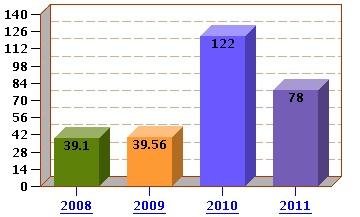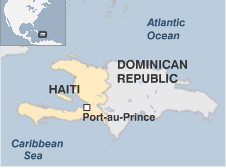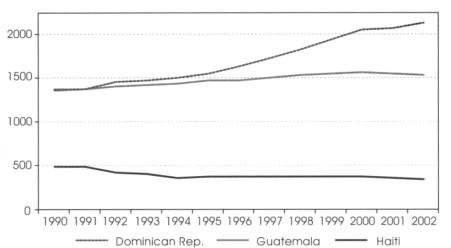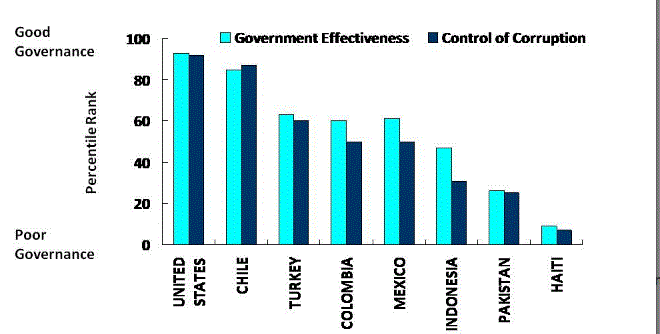The Problem
Haiti is a country that suffers from major political instability, which has deterred the country’s growth and development. Between 1950 and 2008, the country had a record eleven coup d’états highlighting the volatility of the political scene there. In spite of the restoration of democratic rule in 2006, Haiti has continued to suffer from political instability.
Indifferent and ineffective governance that continues to accentuate the instability already experienced by Haiti characterizes the country. These factors have deterred economic development in this South American Country.
The socioeconomic factors in the country are the most serious causes of the instability. The BBC (2012) records that Haiti has a huge wealth gap with a minority 1% owning nearly 50% of the country’s wealth. The poor have engaged in widespread riots or joined gangs due to the lack of alternative means of employment.
The climate of instability has led to a rise of powerful urban gangs and militia who often operate with government sanction. The legitimacy and authority of political leaders are sometimes derived from the power of this militia (Carey, 2005).
At the same time, political instability has had the effect of further plunging the country into economic disarray. The Haitian economy has suffered greatly in light of the political turmoil that has plagued the country. In the mid 1990s, the deepening political crisis led to a drop in international aid. By the end of 1997, the lack of a functioning government led to a freeze in international aid to Haiti, an act that left the formal Haitian economy virtually collapsed (Donais, 2005).
The dependency theory sheds some light on the rampant poverty that has fueled the political instability in Haiti. This theory states “as long as the Third World is linked to the north they can never break free of their dependence and poverty” (Diaz, Trapp & Feldman, 2008, p.3). This is a true reflection of the Haitian situation since as a former colony of France, Haiti’s link to the Western world was established centuries ago.
Even after independence, Haiti continued to rely on the policies and economic support of Western powers. Haiti continues to depend on the international community for financial aid. In addition to this, the country relies primarily on the US as the destination for her exports.

Fig 1: Haitian Borrowing in Millions of Dollars
The world systems theory developed by Immanuel Wallerstein can also be used to explain the situation in Haiti. This theory advances that the world is divided into core countries, which are industrialized capitalist countries and periphery countries like Haiti that rely on low-skill and rely on labor-intensive production. According to the theory, these periphery countries such as Haiti suffer from unequal distribution of labor and exchange and they are exploited by the core countries.
Background
Haiti is geographically located in the Caribbean island of Hispaniola and it shares the Island with the Dominican Republic which lies on its East. The country occupies an area of 27,750 sq kms and has a population of 10.1 million (BBC, 2012). Haiti has over 25% arable land and this land is used for cultivation purposes. The agricultural sector is a major employee in the country with 38% of the population working in this sector (CIA, 2012).

Fig 2: Geographical Positioning of Haiti
The republic of Haiti has had a turbulent political history since its independence from France in 1804. The Haitian political scene has been characterized by authoritarian rule and a military domination. Political leaders appoint their own constitutions to strengthen their hold on power.
The Haitian government is predatory in nature with state resources being used to advance the interests of the elite while the security apparatus suppresses and extorts the ordinary people. In such a government, the elite office holders have viewed the majority poor as objects to be exploited instead of subjects in a shared political system.
Haiti has not exhibited major development since its independence; the country is today the most deprived in the Western Hemisphere. The overreliance on agriculture has led to the high unemployment rate in the country with over 60% of the labor force lacking formal jobs.
The country has an acute shortage of skilled labor while there is a surplus of unskilled labor, a factor that has increased the unemployment rate in the country. In the job market, low-income levels make it hard for those employed to maintain a decent standard of living. Haiti has therefore grown to depend excessively on the international community for its economic sustenance.

Fig 3. Comparing Growth of Per Capita GDP among American Countries
Due to its geographical location and natural resources, Haiti was once a choice destination for tourists. Macollvie (2009) notes that its sandy beaches and beautiful coastal cities once made it a major destination for international cruise ships providing the country with significant amounts of foreign exchange.
However, the political instability has led to major security concerns with kidnappings, deadly riots, and rampant thefts characterizing the country. Due to this reason, many countries have issued travel warnings regarding Haiti thus effectively stifling its tourism industry.
Discussion
Putting the Problem in Context
The problem of political instability is an old one and it has plagued Haiti for over a century. In its formative years, the country operated without state institutions and it was governed by a combination of the military and the elite. This set the tone for the future governance of the country and Macollvie (2009) observes that at no time in the history of the country has there been “a significant degree of long-term popular participation in the political process” (p.72).
The problems in Haiti continue to persist for because of a number of major reasons. To begin with, the efforts of the international community to restore stability never take into consideration the realities in the country.
Donais (2005) observes that the lack of success in international efforts can be blamed on the fact that the positive political change is almost explicitly promoted by outsiders who lack an intimate knowledge of the domestic realities facing Haitians and their thoughts regarding politics.
A lack of adequate economic opportunities has further exacerbated the problem of political insecurity in Haiti. The World Bank best articulates how instability in Haiti mitigates economic growth by noting that the country is “limited in capacity to establish law and order or to create conditions for economic growth and poverty reduction” (Saye, 2010, p.71).
The country is characterized by an unreconstructed winner-take-all political culture. Donais (2005) elaborates that Haiti is a predatory republic where capturing of governing power is the primary means of acquiring wealth and power. Those who are in power are therefore keen to maintain their grasp using all possible means.
Members of the public not involved in politics have taken to violence and drug trafficking to provide for themselves. Drug trafficking is a highly profitable activity and the major drug barons have corrupted the judicial system and the police to ensure that the drugs flow though Haiti uninterrupted (BBC, 2012).
Widespread corruption has further contributed to the political instability and the lack of economic development in the country. Corruption is widespread in Haiti with the government accountability organization, Transparency International ranking Haiti “most corrupt nation in the world”. An official of the organization stated that corruption was so deeply entrenched in the country that it was acceptable as part of everyday life (Saye, 2010).

Fig 4: WGI Government Effectiveness and Control of Corruption
Addressing the Issues
To try to mitigate the outcomes of these problems, efforts have been undertaken by governments. The international community has been involved heavily in Haitian affairs as it tries to address the political issues in the country.
As far back as 1915, the country exhibited acute manifestations of chronic political instability, which prompted US troops to land at Port au Prince on July 28, 1915. The United Nations has engaged in numerous efforts to restore peace, democracy, and stability to Haiti (Donais, 2005).
The efforts of the international community to restore stability to the Haitian political scene have been succeeded but only to some extent. International efforts through the United Nations helped Haiti recover after it failed to stop the threat of an armed insurgency in 2004 (Carey, 2005).
The international community led by the US has promoted policies in Haiti that are aimed at encouraging the installation of democracy in the Country. These policies led to the reinstallation of democracy in 2006. However, such efforts are of no practical use in promoting growth if they are not accompanied by political stability in the country.
The political issues in Haiti have also persisted due to the color tensions that exist in the country. Since independence, Haiti experienced an institutionalization of skin color as a determination of status. The mulattos (light-skinned blacks) made up the elite in society while the noirs (dark-skinned blacks) were the commoners.
Macollvie (2009) state that this division based on skin color created a system of double government that kept power in the hands of the minority mulattos. With time, these divisions became based more on money than on skin color with the government serving the interest of the wealthy and ignoring the poor.
Theoretical and Practical Solutions
The establishment of a law-making branch of government that is not only stable but has the backing of the citizens of the country will also help to bring about political stability in the country. Historically, Haiti has had an inconsistent parliament that did not serve the interest of the masses. Haitian presidents have held power over the parliament, disbanding or dissolving it at will.
These heads of states have been notorious for dissolving parliaments that showed a lack of support for their policies. Macollvie (2009) notes that Haiti’s parliament since independence has been a “farce” serving the interests of the elite and offering no opposition to the president.
A strong parliament that has the support of the citizens will increase the political stability of the country. Such a parliament will have the legitimacy needed to steer the country into stability and economic prosperity.
Enhancement of the democratic institutions in Haiti will increase the likelihood of stability and economic growth. According to the comparability perspective, a mature democracy will accrue direct and indirect benefits that will lead to the economic growth of the country. In such an environment, there will be effective control of governmental power and greater weight will be given to the provision of basic needs of the public.
Capacity building of Haitian security forces and the eventual removal of foreign forces from Haiti will also assist in bringing about political stability. This solution is backed by the State theory which accentuates the importance of security in modern states. This theory advances that the state originates in and is justified by citizens who confer sovereignty on a central authority in exchange for security (Verner & Egset, 2007, p.43).
For decades, Haiti has been faced with numerous international interventions and foreign occupations. In the early 20th century, the country faced foreign occupation mostly from the US and other European powers which wanted to protect their interests in the country. In recent times, Haiti has had UN multinational peacekeeping troops who are there to help in the nation building efforts (Macollvie, 2009).
This reliance on foreign forces has damaged the credibility of the government to protect its citizens. If the international community invested more in building an effective Haitian security apparatus, Haitians would have more faith in their government. This would have the desirable effect of increasing political stability.
The major donors in Haiti can assist in promoting political stability by making it a prerequisite to Haiti receiving aid. As it currently stands, Haiti is not self sufficient and international aid is the major source of government financing.
The Haitian President Michel Martelly is constantly appealing to potential donors to increase support of the country in order for it to meet its budget shortfalls. It is therefore evident that Haiti is greatly dependent on international aid and this fact can be used as leverage in demanding for political stability.
Conclusion and Recommendations
Haiti has suffered from political instability which has deterred the country’s development for decades. This paper has looked at has political instability and social inequality has affected Haiti’s economic development. It has noted that the two factors have led to the near collapse of Haiti as a state.
The use of international interventions and occupations to maintain stability to Haiti have helped to prevent the decline of the country into permanent failed state status but this strategy does not help to create the political stability needed to bring about economic growth and prosperity for the country.
Haiti is receiving a lot of international support in its efforts to develop. The country should use this goodwill to advocate for the development of state institutions. These institutions will provide the basic services for the citizens and promote economic development and social advancement. Well-developed governmental institutions will have the potential to mitigate the risk factors of violence that come from a socioeconomic context.
The country should use its current stability to develop its natural resources. Political instability has contributed to the severe degradation of Haiti’s coastal resources. With stability, the economy of the country will once again be able to exploit its coastal resources for the good of the entire nation.
References
BBC (2012). Haiti country profile. Web.
Carey, H. (2005). Militarization without Civil War: The Security Dilemma and Regime Consolidation in Haiti. Civil Wars, 7 (4), 330–356.
CIA (2012). The World Factbook: Haiti. Web.
Diaz, A., Trapp, A., & Feldman, A. (2008). Haiti Background Report. Web.
Donais, T. (2005). Back to Square One: The Politics of Police Reform in Haiti. Civil Wars, 7(3), 270-287.
Macollvie, J. (2009). Haiti: Hope Turns to Ashes. World Policy Journal, 4(1), 61-69.
Saye, L. (2010). The Haitian State: Something Alien. Journal of Third World Studies, 27 (2), 71-88.
Verner, D., & Egset, W. (2007). Social Resilience and State Fragility in Haiti. NY: Word Bank.